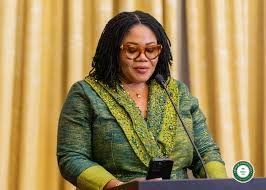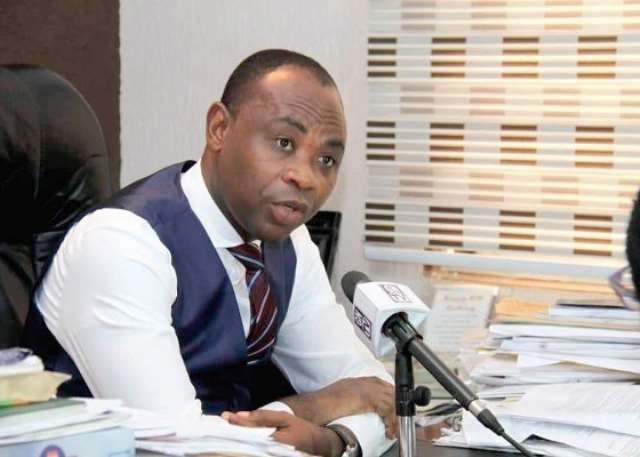News
Low budget, teacher absenteeism, causes of poor performance in basic School.

UNICEF education team and journalists at the event
The decline in budget allocation for Ghana’s basic education sector and high rate of teacher absenteeism have been identified as some of the major causes for the drop in performance of school children at that level of education.
According to a United Nations International Children’s Emergency Fund (UNICEF) statistics, a significant decline in basic school allocation has been recorded in recent years, explaining that in 2019, 39 per cent of the education budget was allocated to basic education, but that figure dropped to 19.6 per cent in 2024.
This came to light last week Thursday at the third UNICEF Media Café addressed by the Chief of the UNICEF Education team, Ms Christin McConnell.
According to her, about 98 per cent of the current budget allocated to basic education is spent on salaries, leaving little room for resources such as infrastructure, learning materials, and teacher training which she said had directly impacted the quality of education received by children.
Also, she stated that about 11 per cent of teachers are absent from school on any given day across all the levels, contributing to the non-effective learning for almost six years.
Despite these challenges, Ms McConnell noted that there had been significant progress in early childhood education with over 120,000 kindergarten children receiving basic learning materials and health screening as part of an initiative dubbed, ‘My First Day at School.’
She further stated that UNICEF’s differentiated learning programme which aims at providing remedial education to struggling students has also been instrumental in improving quality and early childhood education.
An Education Officer at UNICEF Ghana, Ms Rhoda Enchill speaking on access and inclusion in education disclosed that an estimated 40,000 children with disabilities in Ghana had never attended school.
According to her, the figure underscores the ongoing challenges faced by children with special needs in accessing education, despite government efforts to make school more inclusive.
She mentioned that 1.2 million children aged between four and 17 were still out of school across Ghana, adding that the figure included 623,000 primary school-aged children who are not enrolled.
Ms Enchill said despite the progress made in access to education, foundational learning levels remain low explaining that children were still struggling to read at the grade levels.
She indicated that results from the 2022 National Standard Test (NCT) revealed that only five out of 10 children in grade four could read.
And as part of efforts to standardise and promote inclusivity and sign language in the country, Ghana has developed a harmonised sign language dictionary for deaf teachers and learners.
A sign language dictionary is a resource that provides definitions, illustrations, or video demonstrations of signs used in a specific sign language.
The dictionary, she stated, will serve as a reference for both deaf and hearing individuals to learn and understand the meanings and hand gestures associated with words, phrases, or concepts in sign language.
By Jemima Esinam Kuatsinu
News
‘Stop shielding perpetratorsof Gender-Based Violence’By Spectator Reporter

THE Minister of Gender, Children and Social Protection (MOGCSP), Dr Agnes Naa Momo Lartey, has called on traditional authorities, religious leaders and community influencers to stop shielding perpetrators of gender-based violence and allow the law to work.
She said too many cases were being buried at the community level, with abusers protected while victims were pressured into silence. This, she stressed, must end.
Dr Lartey made the call on Tuesday at the national launch of the 2025, 16 Days of Activism Against Gender-Based Violence campaign, held at the Kaneshie Main Station in Accra.
This year’s campaign, observed globally from November 25 to December 10, is on the theme: ‘Unite! End Digital Violence Against Women and Girls.’
It highlights rising incidents of cyberbullying, online stalking, image-based exploitation and other forms of technology-facilitated abuse that disproportionately affect women and girls.
The minister urged the media to use their platforms to condemn abuse and intensify education, noting that no person should “die in silence’’ in a society that values dignity, equality and the principles of Sustainable Development Goal 5.
She also encouraged women, girls, men and boys to report any form of abuse, assuring the public that support services were available to all, regardless of age or social status.
Dr Lartey described gender-based violence as one of the most pervasive human rights violations in Ghana. She referenced a 2016 Domestic Violence Survey showing that 27.7 per cent of Ghanaian women have experienced domestic violence, as well as a 2014 Demographic and Health Survey which revealed that 32 per cent of girls aged 15–24 believe wife beating was justified—an indication of harmful societal norms.
Calling the situation “unfortunate and sad,” she stressed that the nation must dismantle cultural beliefs that excuse or normalise violence.
Outlining government actions, Dr Lartey announced that Cabinet has approved the revised National Domestic Violence Policy, while the updated Domestic Abuse Bill and its Legislative Instrument were being finalised by the Attorney-General’s Department.
She also disclosed plans to operationalise a national shelter in Accra and begin constructing the 16 regional shelters promised to strengthen protection systems for survivors.
Additionally, the ministry has trained 200 market leaders as paralegals and 100 professionals, including psychologists, medical workers and legal experts, to support victims with referrals and counselling.
UNFPA Country Representative, Dr David Wilfred Ochan, reaffirmed the agency’s support for Ghana’s efforts. He unveiled a nationwide initiative titled “16 Stations, 16 Routes, 16 Destinations,” which will use the country’s public transport system to raise awareness on gender-based violence.
In partnership with the Ghana Private Road Transport Union (GPRTU), the initiative will promote stickers, public announcements, training and codes of conduct to ensure that transport stations become safe spaces where commuters, traders, porters and young people can access information and hotline services to report or prevent abuse.
Join our WhatsApp Channel now!
https://whatsapp.com/channel/0029VbBElzjInlqHhl1aTU27
News
Safeguard religious rights ofstudents – CRI urges studentsBy Spectator Reporter

CHILD Rights International (CRI) is urging the government to adopt a firm and comprehensive national policy to safeguard the religious rights of students in secondary schools, insisting that no child should be denied education or the freedom to express their faith.
In a statement issued on Thursday in Accra, the organisation said the recent controversy involving Wesley Girls’ Senior High School highlights deep-seated gaps in how children’s rights were upheld within the country’s long-standing educational structures.
According to CRI, the incident underscores the need for Ghana to reassess the relationship between school traditions and the constitutional rights of students.
The group emphasised that the right to education and the right to religious expression were fundamental, and must be reflected consistently in rules and practices across all schools.
Additionally, CRI noted that many well-known mission institutions such as Holy Child School and St. Louis Senior High School operate on religious foundations that have shaped their administrative cultures for decades.
These differ significantly from state-established schools like Ghana Senior High School in Koforidua, Tamale Senior High School and Achimota Senior High School.
This contrast, CRI argued, raises an important national question and what policy framework has guided these mission schools since their incorporation into the public system?
Although the government has declared all such schools secular, they continue to function as government-assisted institutions, maintaining a hybrid structure that leaves them neither fully autonomous nor entirely under the Ghana Education Service (GES).
This unclear arrangement has led to inconsistent rules on discipline, conduct and religious expression from one school to another.
CRI warned that the absence of a unified and enforceable national policy leaves significant gaps in the protection of children’s rights.
While rights may be universal, the group emphasised that their protection depends on strong and clearly defined state regulations.
The organisation further stated that the State has yet to assume full regulatory authority over the schools it supports financially. As a result, key administrative and disciplinary decisions often remain at the discretion of individual school authorities, creating uneven standards nationwide.
For the rights of children, particularly their right to practise their religion to be fully realised, CRI believes the government must move toward full regulatory ownership of all schools it funds or classifies as public.
Without this, tensions between deeply rooted school traditions and constitutional freedoms are likely to persist.
The statement stressed that once a school admits a student, it takes responsibility not only for their academic development but also for respecting their identity, including their religious background. Therefore, no child, CRI insists, should be prevented from practicing their faith within the school environment.
Moreover, the organisation called for the establishment of clear national standards that guide schools on accommodating religious expression without compromising discipline or institutional order.
It also urged the government to strengthen safeguarding systems with firm oversight and routine monitoring to ensure that children’s rights are protected based on national law, not historical customs or administrative discretion.
CRI admonished the government to clarify the official status of government-assisted mission schools to ensure that the rights of all students are upheld consistently across the country.
By Spectator Reporter
Join our WhatsApp Channel now!
https://whatsapp.com/channel/0029VbBElzjInlqHhl1aTU27













